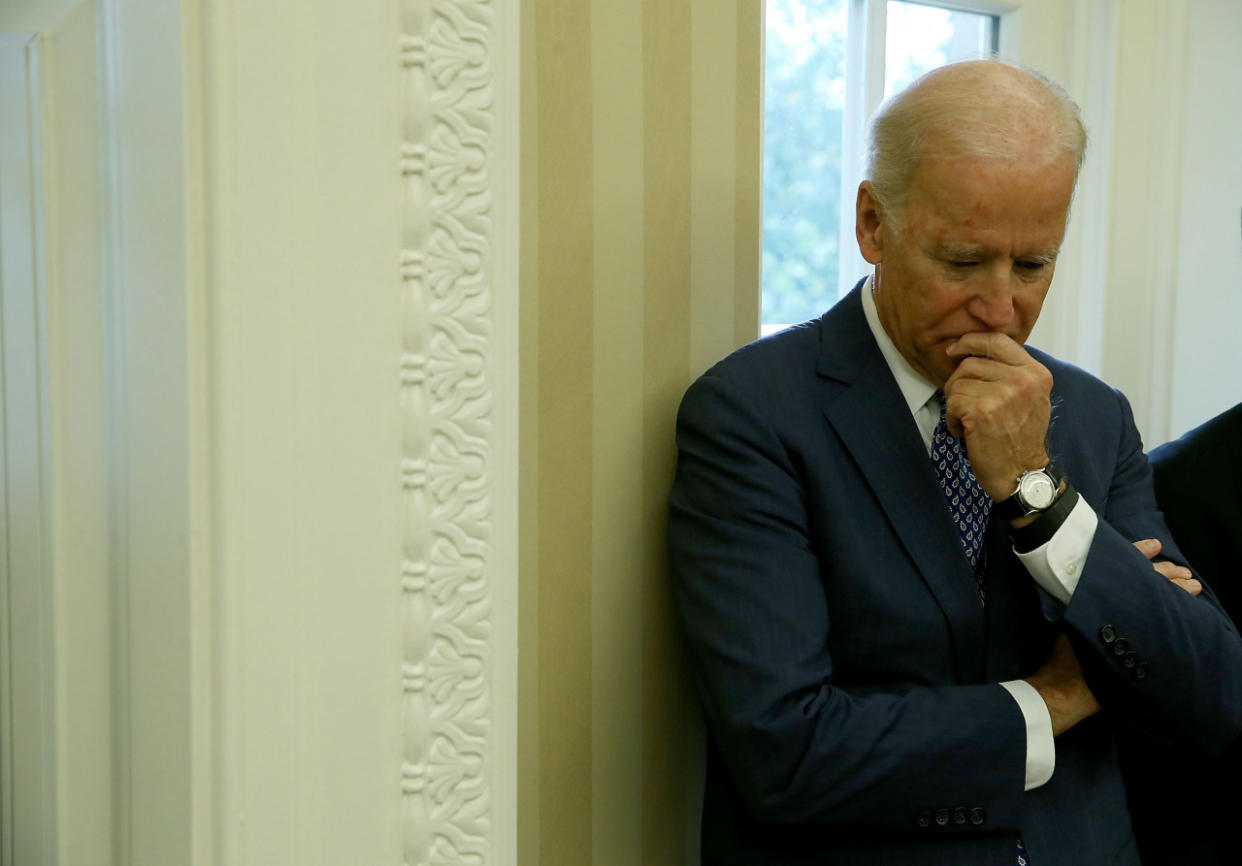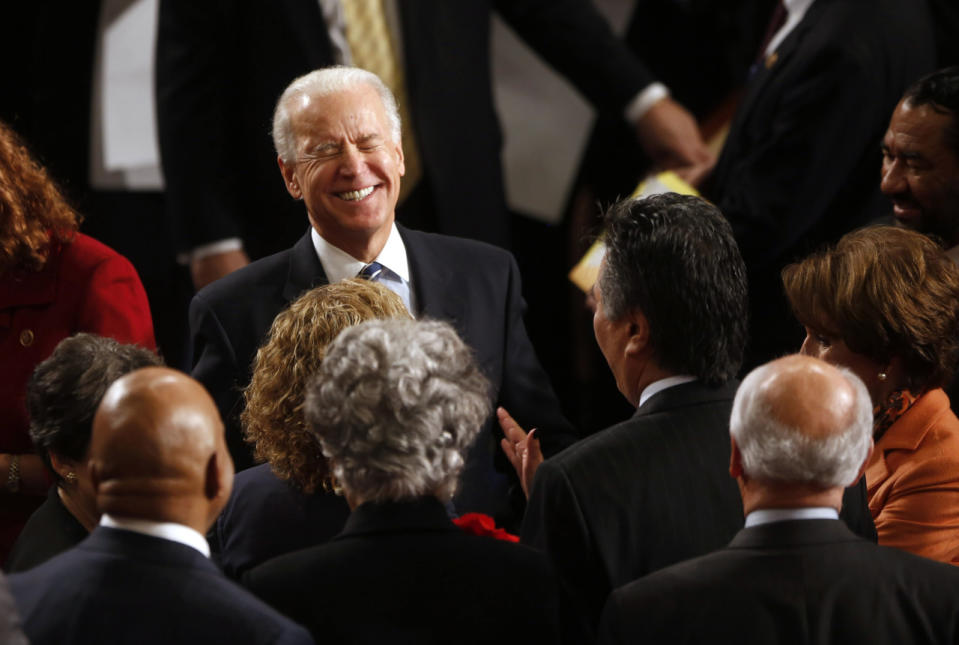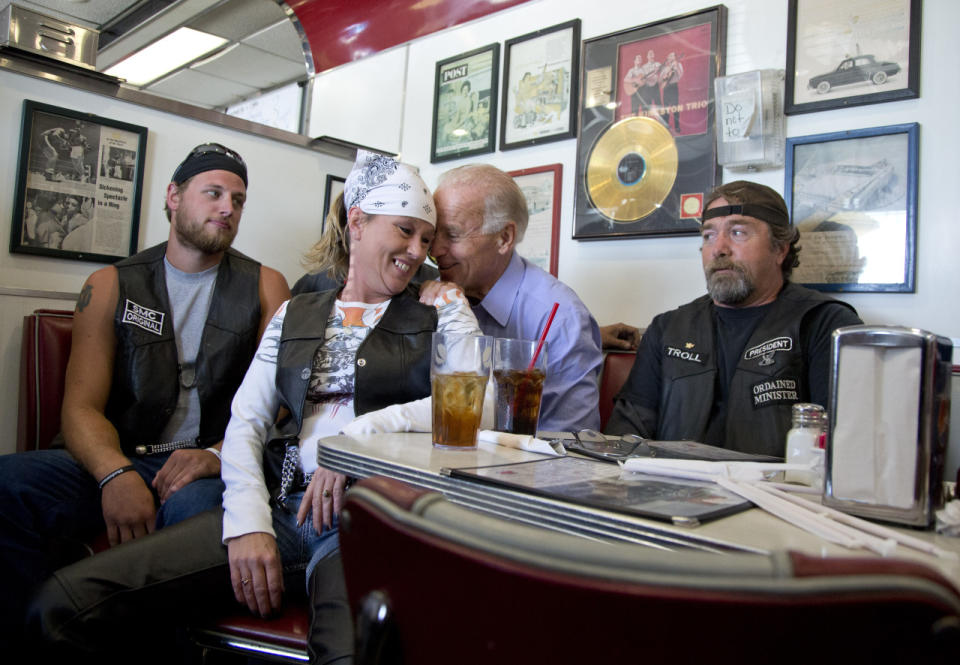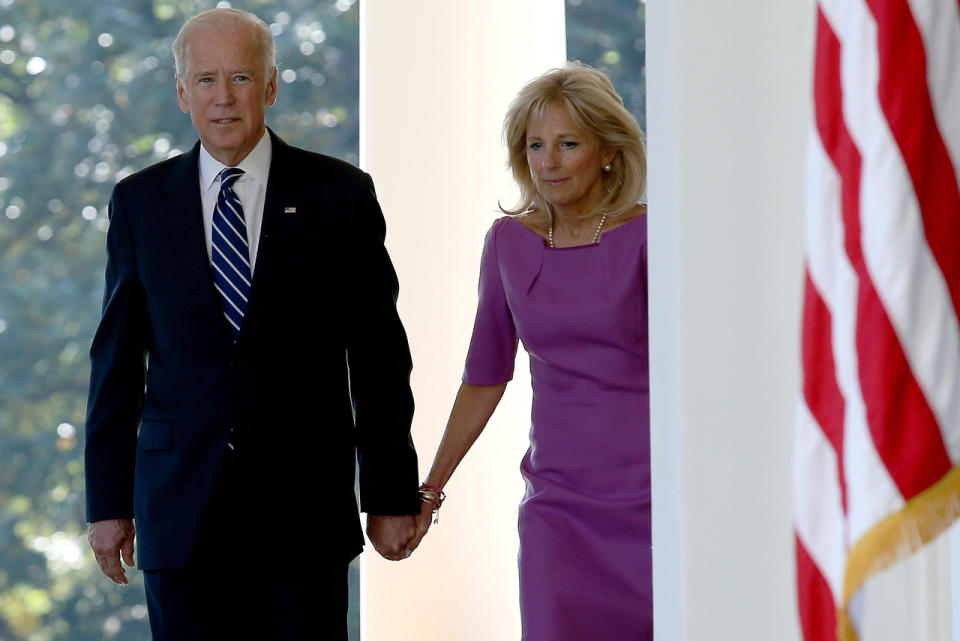What becomes of Joe Biden now?

Vice President Joe Biden in the Oval Office. (Photo: Mark Wilson/Getty Images)
Long before Vice President Joe Biden walked into the Rose Garden Wednesday and gave up his dream of one day being president, he knew he was at a crossroads. Friends and associates of his say Biden had been grappling with the question of his future for more than a year.
Biden, they say, has always considered himself as a person who lived in the present. “Live for today,” he regularly admonished those around him.
It’s a lesson that dates back to the loss of his wife and daughter in a tragic car accident nearly 43 years ago. And when unbearable tragedy struck again this past May with the death of his son, Beau, from brain cancer, Biden tearfully repeated that mantra to those who called to console him: “Live for today.”
But the question that has increasingly plagued Biden has been more about tomorrow. What happens when his time in the White House comes to an end in January 2017?
For the vice president, the question of whether to seek the Democratic presidential nomination was always about more than just securing the support of his family or the ability to assemble a strong campaign. It was about more even than the question of whether he could win. It was also about what would become of Joe Biden, lifelong political officeholder, when he departed the highest office he has ever held.
The vice president, who will turn 73 in November, is facing the potential twilight of the only career he has ever really known, one he has inhabited in a way few other politicians have. He was just 27 when he was first elected to political office — a seat on the New Castle County Council in Delaware. Three years later, he ran for U.S. Senate and won. Just 30 at the time, he was the sixth-youngest senator in U.S. history. All told, he’s spent nearly 46 years in office — more than half of his life — and Biden seems to have enjoyed nearly every minute of it.
Perhaps no politician since Lyndon B. Johnson has thrived on and loved public office more than Biden. Like LBJ, a creature of the Senate who also ascended to the White House, Biden has delighted in the nitty-gritty details of lawmaking and the art of making a deal and forging compromise even among political enemies. Even when he moved from the U.S. Capitol to the White House in 2009, Biden was down at the Senate so much — working out at the gym and meeting with old friends — that many of his colleagues joked that he’d never really left.

Biden on the Senate floor in 2013. (Photo: Jason Reed/Reuters)
Biden takes satisfaction in the parts of being a politician that others — Obama included — often do not relish, including the endless grip and grin of hands-on politicking. Even in the hyper partisanship of the nation’s capital, people on both sides of the political divide would agree one of the greatest joys of C-SPAN every two years has been Biden’s ceremonial swearing-in of members of the Senate. For hours every other January, the vice president has teased lawmakers across the political spectrum, cooed at their kids and flirted with their wives, sisters and mothers in a way that is somehow endlessly endearing.
Along the way, people began to affectionately refer to Biden as “Uncle Joe,” including people in the West Wing. Yet the most enduring image in pop culture came via The Onion, which began to regularly parody Biden as a lovable goofball who sold weed on the side and washed his classic Trans Am in the White House driveway shirtless. Biden was hurt by the depiction at first but soon was in on the joke. Actually, Biden told Yahoo News in 2011, “I have a Corvette — a ’67 Corvette — not a Trans Am.”
Washington has never seen a politician quite like Joe Biden — and probably never will again. But where does that leave Biden?
For all of Biden’s focus on living in the present, the question of the future has nagged him at the back of his mind for years, those close to him say. In the Senate, he dreamt of the presidency — enough to run for it two times, even though he had little shot of winning.
Late at night, stuck on the Hill for votes, he was known to “shoot the s—” with his staff, according to a former Senate aide, contemplating that great mystery of what might happen after he left the Senate. Those in the know refuse to say what Biden was thinking back then, but it all seemed like an empty exercise anyway. Nobody could think of anybody who loved the Senate more than Joe Biden or who was less willing to leave — not even Joe Biden.
The love was so deep that even when Obama asked him to serve as his vice president in 2008, Biden hesitated. Would being vice president really be better than serving in the Senate?
Ultimately Biden agreed to be Obama’s running mate — a decision that thrilled Obama advisers who had championed the longtime Delaware senator, believing he had no future political aspirations and therefore wouldn’t behave as a free agent trying to forge his own identity in advance of another run for office. For a while, Biden played ball. In a January 2009 interview with the New York Times, Biden denied he was looking at a 2016 presidential bid. “That is not my intention,” he said. “This is in all probability, and hopefully, a worthy capstone in my career.”
But it wasn’t long before Biden reversed himself again. He told CNN in 2011 that he was in the “best shape of my life” — a nod to the haters who said he was too old to run again. He insisted he wasn’t taking himself out of consideration for anything, even running for president again. “I’m enjoying what I’m doing. And as long as I do, I’m going to continue to do it,” he said.

Biden meets a group of bikers at an Ohio diner while on the campaign trail in 2012. (Photo: Carolyn Kaster/AP)
According to those around him, he was aware of and wounded by the idea that Hillary Clinton was perceived as the next in line, that the 2016 Democratic nomination was hers to lose.
He knew all too well what many Democratic operatives — including those close to Obama — said about him: That he was too old for the job, that his time had passed. But like many lawmakers who have lived out their lives in public service, he simply didn’t feel like he was done. In fact, friends say, he has never imagined a life of taking it easy.
“Retirement isn’t really in his vocabulary,” Ted Kaufman, a longtime Biden friend and adviser who was his chosen successor in the Senate, said in an interview earlier this year.
In 2012, Biden donated his nearly four decades of Senate papers to his alma mater, the University of Delaware. Around that time, according to multiple sources, school officials pitched the vice president on the idea of opening what they described as the “Biden Center” — a presidential library-type institution where he could work after leaving office.
A spokesman for the school declined to comment, but a source who declined to be named discussing the private negotiations said that Biden told the school he could not entertain the idea until after he left office.
In many ways, the proposed center would be an ideal fit. Many close to Biden don’t expect to see him try to cash in on his decades of experience by hitting the speaker’s circuit — in spite of the fact he’s one of the least wealthy public officials in Washington. Instead, one said, Biden would rather try to “do something with what he’s learned and experienced.”
While he has been vague about specific plans, the former Senate Foreign Relations Committee chair has said privately that once he’s out of office he would like to put his decades of diplomatic work to use. But it’s unclear if Biden envisions himself to be a statesman who could continue to negotiate on the country’s behalf — in the vein of former President Jimmy Carter or former United Nations ambassador Bill Richardson — or whether any future administration would actually invite him to do so.
Some Democrats have floated the idea that Biden could be Clinton’s secretary of state or play another diplomatic role in her administration — though it seems unlikely. At the same time, Biden has frequently joked with reporters about moving back to Delaware and running for office there. “County council or something,” Biden has said.
Or Biden could just go back to Delaware and be a grandfather, enjoying his first real break in years — though those close to him don’t see that happening.
“He loves every aspect of politics and public service, and you see that joy in every step he takes,” said Bruce Reed, a longtime Democratic strategist who worked as Biden’s chief of staff from 2011 to 2013. “There are plenty of people in politics and Washington who can’t wait to give up some part of it, but not him. I think if he had his way, he’d would keep talking to foreign leaders and working rope lines and hammering out agreements for as long as he’s still standing.”

Biden and his wife, Jill, head into the White House Rose Garden on Wednesday. (Photo: Win McNamee/Getty Images)
Speaking to reporters at the White House Wednesday, Biden sounded emotional as he spoke of his decades in office.
“I’ve had the very great good fortune and privilege of being in public service most of my adult life, since I’ve been 25 years old,” Biden said, with Obama and his wife, Jill, at his side. “And through personal triumphs and tragedies, my entire family … and this sounds corny, but we found purpose in public life. So we intend, the whole family — not just me — we intend to spend the next 15 months fighting for what we’ve always cared about, what my family has always cared about, with every ounce of our being.”
As Biden walked away from the podium, left unanswered was the question of what happens next — perhaps because even he doesn’t know the answer.


